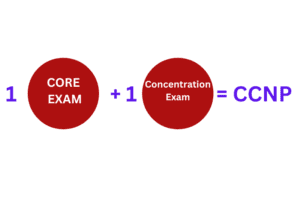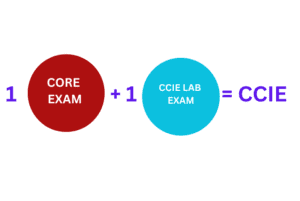Introduction
I had some difficulty navigating Cisco’s Professional certifications even as someone who has been in the industry. If you are having a similar challenge -especially as a beginner- do not worry, this blog post will quickly highlight some facts about the CCNP Certifications you should know. And answer some common questions about the CCNP Certification and the exam.
So let’s begin.
1. What is the CCNP?
The CCNP stands for “Cisco Certified Networking Professional Certification”. The CCNP is a professional-level certification from Cisco that validates skills in certain areas of IT Education and training. These areas range from Enterprise Networks, Security, Collaboration, Data Center, DevOps, etc.
The CCNP is a step higher (more advanced) than the popular CCNA certification – an associate-level certificate.
2. CCNP Certification Types
There are broadly seven different types of CCNP Certifications or Core Areas. Each of these core concentrations focuses on a different area of technology.

These CCNP types are as follows;
- CCNP Enterprise
- CCNP Data Center
- CCNP Service Provider
- CCNP Security
- CCNP Collaboration
- Cisco Certified CyberOps Professional
- Cisco Certified DevNet Professional
For each of these CCNP certification Cores or types, you also choose a much smaller area to specialize in. For example, Someone can be a CCNP Enterprise Professional with a specialization in Designing Cisco Enterprise Networks (ENSLD), Implementing Cisco Enterprise Wireless Networks (ENSLD), or Implementing Cisco SD-WAN Solutions, (ENSWI) etc.
3. What are the CCNP exams?
The CCNP has two qualifying exams. A CCNP Core Exam and a CCNP Specialization or Concentration Exam.

Here is how it works; you choose 1 Core Exam (from the current available 7), and then you choose from any 1 corresponding Specialization exam in that Core or acceptable options in Cisco’s blueprint.
It is also possible to have multiple CCNP certifications in a particular CCNP type by simply taking 1 Core exam and then multiple concentration exams.
There are currently seven (7) Core CCNP exams and over 35 Concentration exams to choose from. That makes the total number of possible CCNP Certifications to be 35+.
The Cisco Core exams are
- ENCOR 350-401 (Enterprise Network)
- SPCOR 350 -501(Service Provider)
- DCCOR 350-601( Data Center)
- SCOR 350-701(Security),
- CLCOR 350-801 (Collaboration),
- CBRCOR 350-201 CyberOps
- DEVCOR 350 -901 (DevNet).
4. CCNP Certification Cost
There are two separate exams for you to become fully CCNP certified. The Core Exam costs $400 while the Concentration exams cost $300. Candidates in the UK will pay £320 and £240 for the Core and Concentration exam respectively.

So expect to pay a total of $700 (or £560 in the UK) to get your CCNP, not including the cost of training and materials. The exam is accessible either online or through a testing center (Pearson Vue).
5. What is the Minimum Passing Score For The CCNP Exam?
Cisco does not specify the passing score for the exam. The passing score will depend on the particular sets of questions you were served from the exam bank. However, The minimum score for passing the CCNP CORE Exam is about 825/1000 in most cases.
The minimum score you can get is 300. With that in mind, if you score 70 percent of the questions, you should be able to pass the Exam. This is also true for associate-level exams like the CCNA, CyberOps, and DevNet.
6. The Validity Period For The CCNP Certificate
Like most other Cisco Certifications, the CCNP certification is valid for 3 years from the date of its issuance. There are three ways for you to keep your certification valid.
- By earning Continuing Education Credits (CE)- You can earn recertification credits by attending Specified Cisco’s Instructor-led training, e-learning course on the Cisco CE Portal Platform, Cisco Meet-ups, seminars, and training, taking exams, etc.
- By Passing the Qualifying exams
- By Combining both Passing the Qualifying exams + Earning Continuing Education Credits.
Here is the challenge I find with Cisco recertification, you will have to keep both the Core Exam and the Concentration exam active for your certification to remain valid. It is therefore important to keep an active learning session on the CE Portal, and continuously earn CE to keep your certification active.
7. CCNP Security vs CyberOps., How do they Differ?
These are two similar Cisco Professional-level certifications in Security with some differences. The CCNP Security is the much older of the two certs and focuses more on building a secure IT infrastructure. Its emphasis is on Cisco devices e.g., Cisco Firewalls and other Security devices.
While the CCNP CyberOps is more generic and is focused on meeting the day-to-day cybersecurity challenges – Cybersecurity Operations such as in a SOC Center, it is not just for Cisco devices or its environment.
For Cisco, building a secure IT infrastructure(CCNP Security) is a crucial step in implementing a good and secure environment (CCNP CyberOps). So the two certifications go hand-in-hand.
8. How Many Questions are In the CCNP Exams
The Core Exams have 90- 105 questions (100 questions on average), and the duration is 120mins, while the Concentration exams have 55-65 questions for a duration of 90mins.
Most persons will take and pass the Core exam first before proceeding to concentration exams. There is a good reason to do so. The Core exam is much more extensive and covers broad concepts common to all the other Concentrations under the CCNP type.
9. How long does the CCNP course take?
How long it takes you to prepare for the CCNP Exam depends on your experience and your foundations. It is a professional exam and much more challenging than the CCNA. Most people on average will take between 4 – 8 months to prepare.
Many people also self-study and pass the CCNP. The general advice is that you use study materials from different reliable sources as your resource. You will also need to read much of the official documentation from Cisco on the different technologies.
10. What Certifications Do I get For Passing Only the Core Exam or Concentration Exam
Cisco is strict in its requirement for awarding the Professional Certification. Suppose you only pass or have just one of the two exams qualifying exams (Core or Concentration Exam). In that case, you are awarded a CCNP Specialist certification in that technology.
You MUST pass a Concentration and a Concentration exam in the same track (a few exceptions apply) to be certified as a CCNP.
11. Is CCNA Required for CCNP?
The CCNA is not a requirement for you to take the CCNP Certification. The CCNP is separate and independent of the CCNA and you can enroll for the exam directly without taking the CCNA.

It is important to note however, that many of the foundational topics of the CCNP are in the CCNA, so it makes sense to take the CCNA first or at least study the CCNA Course materials.
Cisco designed the CCNP Certification for professionals with some work experience. You can however still take the certification even without such background, as long as you are willing to devote your time and resources to learning at the professional level.
12. How Much Does CCNP Earn
This varies depending on the tracks. The average salary of the CCNP in the US is about $111,000/yr. (ZipRecruiter, 2024) or about $53 per hour. The average in the UK is about £60,000. Tracks like CCNP Security/CyberOps may earn significantly more because of the huge demand in such a niche (Cybersecurity).
13. Will CCNP get you a job?
The CCNP equips you with professional-level skills to boost your career and get employed at a mid-level/professional level in most of its different domains or tracks. Most Employers do, however, place more premium on the value of real-world, hands-on practical experience than just certifications.
The CCNP can get you a job but much faster if matched with some work experience. Learn the practical aspects of the CCNP Certifications and apply them to real-world projects.
14. CCNP Certifications and the CCIE
The Cisco Certified Internetwork Expert (CCIE) is Cisco’s highest certification level. Its relation with the CCNP is that it uses the Core Exam of CCNP as its prerequisite.

You only need to pass the CCIE Lab Exam in addition to the corresponding CCNP Core exam to get the CCIE Exam. Experts who have taken the exam consider the Lab exam to be very intense and challenging.
Read more: THE CCNP CERTIFICATIONS PATHWAY – EXAMS, CAREER AND OPPORTUNITIES




